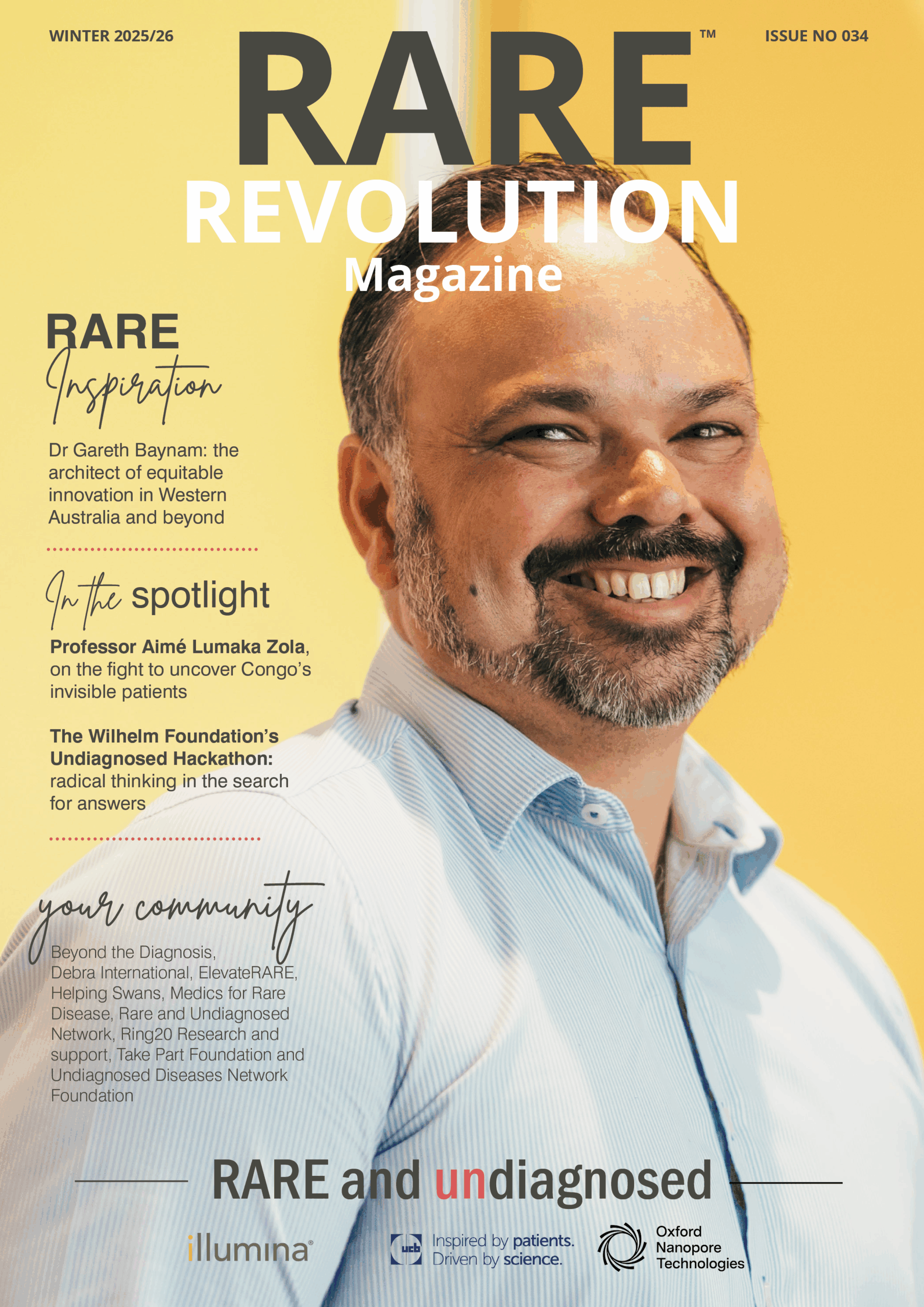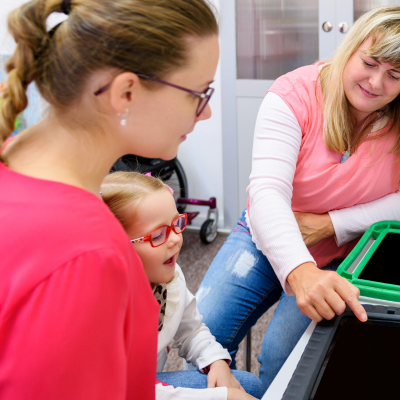Who cares for the carer?
FUNDED BY ACADIA PHARMACEUTICALS GMBH

Becky Davis is a dedicated and resourceful caregiver who has devoted much of her life to supporting her daughter Rosie, who lives with Rett syndrome. Becky has played a pivotal role in organising Rosie’s care, navigating the many challenges and hurdles of fragmented healthcare and social support systems. She has served as CEO of Rett UK, president of Rett Syndrome Europe, and founded additional local support initiatives for families. Becky has seen much change across the sector in the 30 years since Rosie was diagnosed, but little of that change has been directed toward improving the landscape for rare disease carers
Written by Nicola Miller, RARE Revolution
Interview with Becky Davis, trusts and foundations officer, Rett UK, and president, Rett Syndrome Europe
Becky’s daughter Rosie is a vibrant 30-year-old woman living with classic Rett syndrome, a rare neurological disorder she was diagnosed with at just 14 months old. Despite facing significant medical challenges throughout her life—including severe epilepsy and breathing difficulties—Rosie is currently in a stable and positive place, surrounded by the support of her family and a dedicated care team. She lives in a specially adapted annexed space within the family home which allows her both independence and comfort and she is supported by a team of external carers who supplement Becky’s in home care. Known for her keen awareness, sense of humour and strong personality, Rosie communicates using advanced eye-gaze technology, which enables her to express her thoughts, preferences and wit.
But the picture hasn’t always looked this bright for Rosie or Becky, as Becky explains.
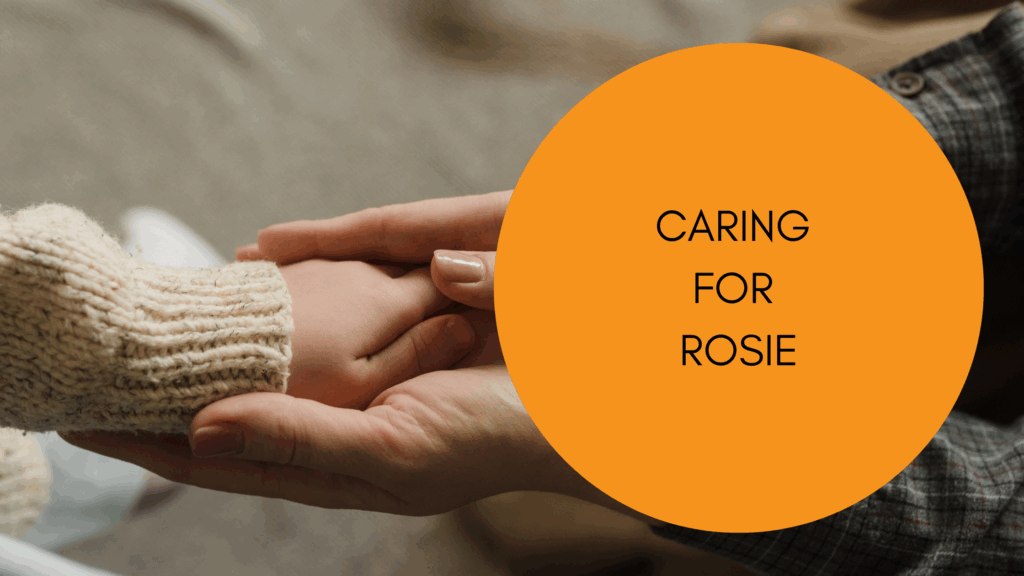
From the moment Rosie was diagnosed with Rett syndrome as a small infant, Becky’s life shifted dramatically, thrust into the role of primary caregiver to a baby with highly complex needs. Immediately recognising the magnitude of the diagnosis Becky recalls, “The very day she was diagnosed was the day I gave up my job. I remember calling my boss and saying ‘I’m never coming back. I am still going to be changing nappies when she is 30!’ It makes me laugh now, thinking of what I said and how I reacted, but at the time, with no experience of disability, and in the throes of everything that comes with having a new baby, that was the first thing that came into my head. Today, of course, I thank God I am still changing her nappies (now pads) because that means she’s still here with us.”
In the early years, Becky delivered most of Rosie’s care herself, with only patchy and fragmented support. As Rosie grew, the family managed to access some limited services, providing much needed relief: “From aged 10 to 18, we accessed local respite services, which was outstanding. We received respite support five nights a month and twice a year we could do a full week. By this time, I had two younger sons, so we could use this time to do things focussed on them.” The demand of Rosie’s complex needs meant that family routines were often disrupted as Becky recalls:
“That was definitely the hardest time. There’s no doubt, it was incredibly stressful, and particularly when she was ill as well—and she was ill a lot. There were lots of hospital visits and appointments… It just all became very difficult. Even things like having a friend back to play with the boys was challenging because I didn’t feel I could safely look after someone else’s child as well as Rosie.”
Emergencies with Rosie would take precedence, forcing Becky to drop everything and focus on her daughter’s immediate needs. The lack of adequate childcare options led Becky to start an after-school club and holiday play schemes, so that Becky could work while also spending time with the children all together outside of the home.
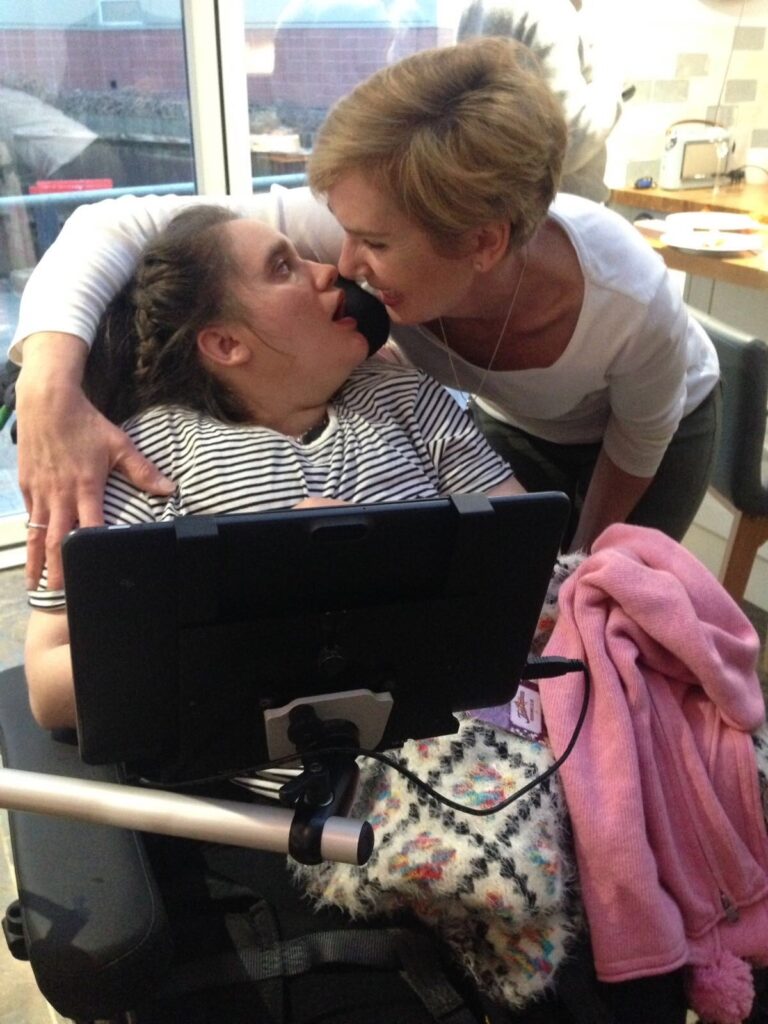
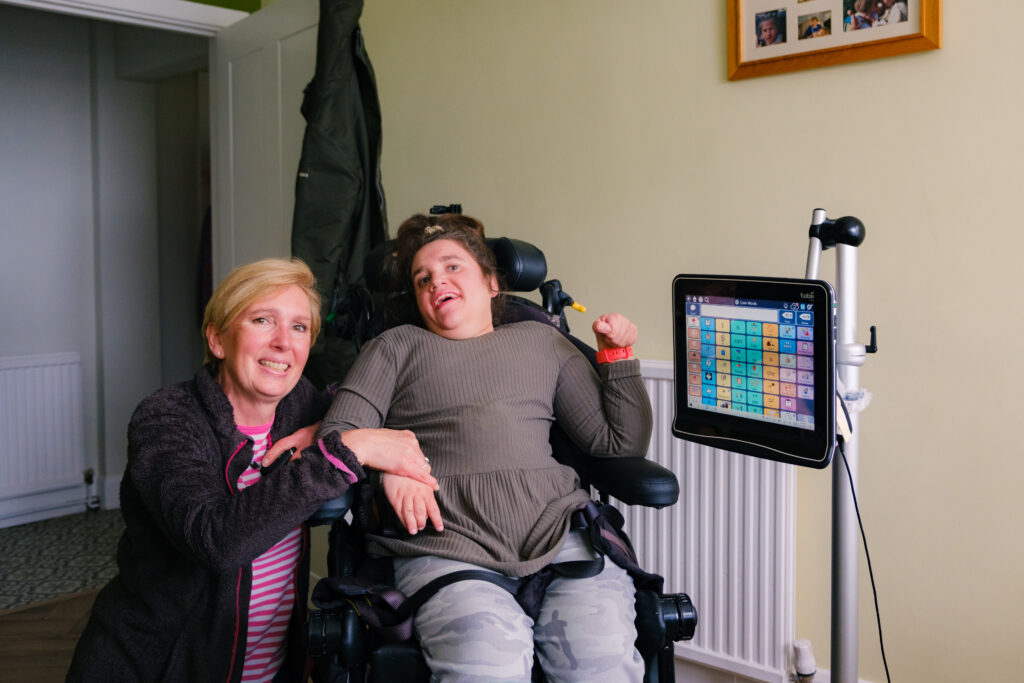
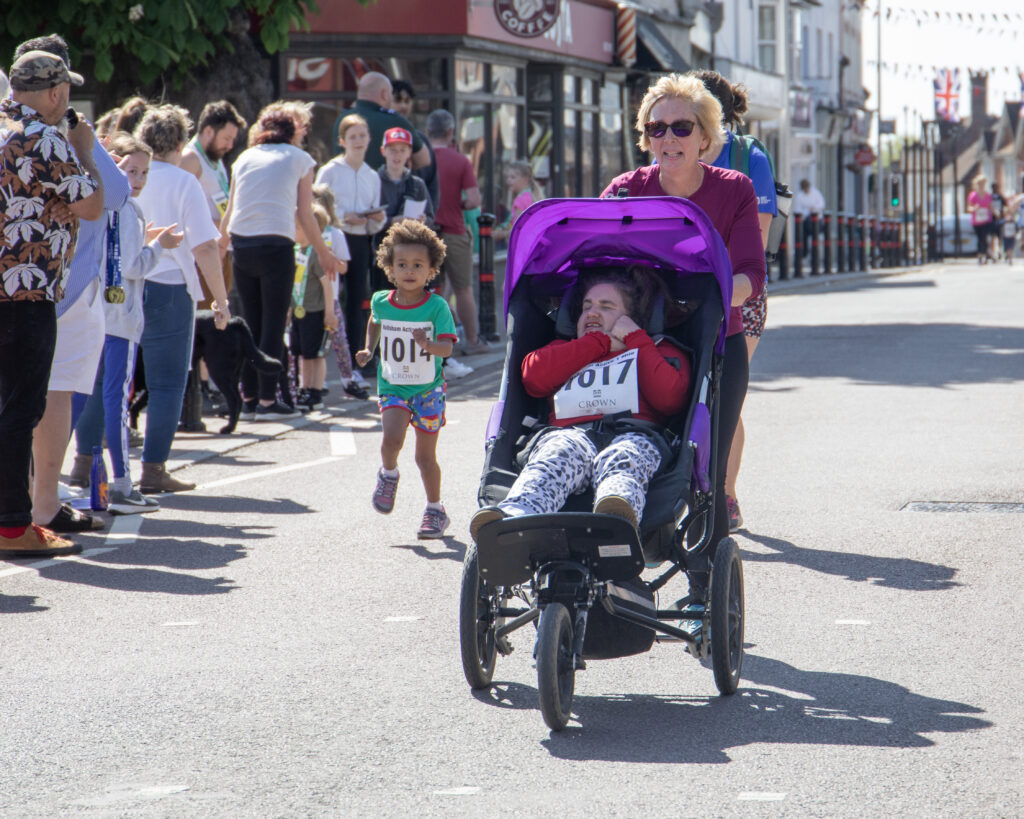


As Rosie aged out of child services, transitioning to adult services brought new challenges, and Becky often found herself fighting for the age-appropriate support Rosie needed. During this time, Becky was also juggling full-time employment, having re-entered the world of work. The limited respite now available meant that Becky rarely had the opportunity to rest or focus on her own needs, and the burden of managing complex care, appointments and emergencies fell squarely on her shoulders. The emotional and physical toll during this period was “immense”, as Becky worked tirelessly to ensure Rosie’s well-being while striving to maintain some sense of normalcy for the rest of the family. Becky now takes pride in seeing that her sons have grown into independent and empathetic young men—shaped by their early childhood experiences of growing up alongside Rosie.
Professionally, having given up her pre-family career, Becky later built a career in advocacy to fit around her family’s needs. But of course, working with other families affected by Rett was not a reprieve from her care role, but rather an extension of this—a role which also brings significant emotional toll, alongside the ability to make a positive impact.
In recent years, Becky’s caregiving responsibilities have evolved having secured a more comprehensive care package for Rosie, which Becky is incredibly grateful for.
“Over the last four years, that’s the most support that we’ve ever had. With a dedicated care team now in place.”
This has allowed Becky to be able to step back from some of the day-to-day care, though she remains deeply involved in coordinating and advocating for Rosie’s needs. But this level of care is far from secure. Each year, Becky faces the stressful process of the annual review for Rosie’s NHS continuing healthcare funding, a process that brings much anxiety. While she is grateful that Rosie’s health has stabilised, this improvement paradoxically puts her care package at risk.
“It is now a fight to maintain this provision, and it is a real concern now—and this is a ridiculous situation to be in. I should be (and am) elated at her current stable status—we’ve not had to resuscitate her in the last 18 months, and she’s not currently having these horrible seizures. But at the same time, that relief now puts her funding at risk.”
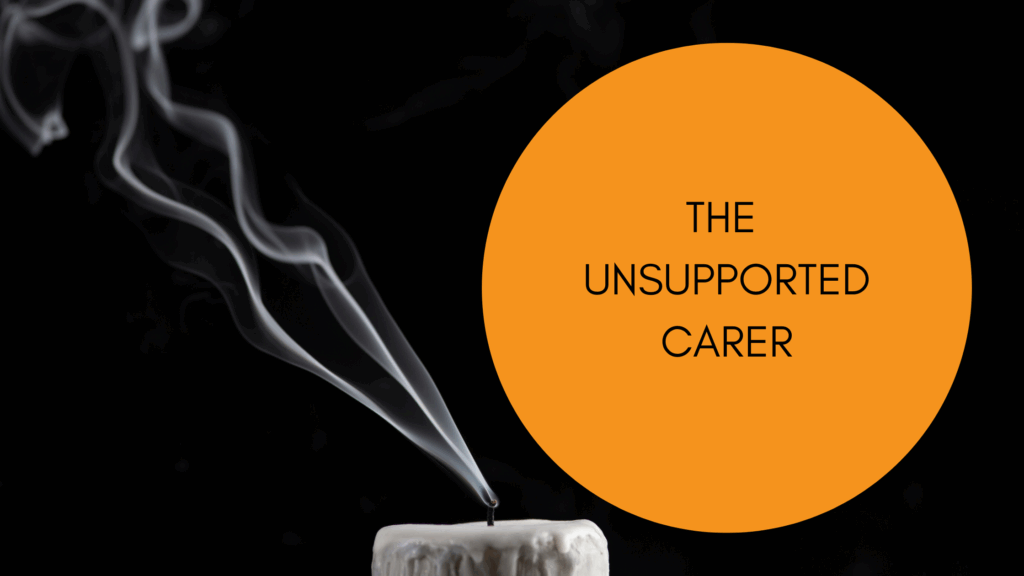
Reflecting on her both her personal and advocacy experience Becky is clear that today, support for family carers remains largely unsupported—leaving carers overburdened, and at times, near breaking point. Becky believes the greatest failings fall into three categories: lack of coordinated holistic care, absence of emotional support and lack of guidance around long-term care planning.
The absence of a central figure to oversee complex care is a pivotal failing of the healthcare system, Becky feels: “The biggest challenge is the lack of coordination, lack of holistic approach—for Rett syndrome there isn’t the opportunity to have an MDT (multi-disciplinary team) type assessment, which is needed when multi systems are involved—you need people to talk to each other and collaborate. And they don’t.” This leaves the burden of this role to the caregiver, which as Becky describes, can be “exhausting”.
Becky also points to the emotional toll and the lack of counselling or wraparound care for families. When asked what access or offers of emotional support her family have been offered (outside of a charity setting) Becky’s response is simple: “None. None whatsoever.”
To plug this gap, the charity Rett UK fund a counselling service, which they hope to be able to continue subject to ongoing funding. Becky adds, “Not everyone has an option to privately fund counselling or be self-resilient without that external support. There is a sizeable gap there. For most GPs and paediatricians, counselling or emotional support for caregivers just isn’t on their radar.” There is an immense toll in constantly having to advocate for support, as Becky adds, “You’ve got to keep phoning. You’ve got to keep banging on doors. It’s completely exhausting and draining.”
Planning for long-term care also remains an ongoing anxiety and uncertainty for families like Becky’s. While the current arrangement for Rosie works well, Becky acknowledges the difficulty in looking further ahead, especially after years of medical instability.
“If you’d asked me that 18 months ago, I would have said she’d probably only got six months to live. So, we hadn’t really gone any further with that line of thought—the expectation was that she wasn’t going to be here.”
Now, with Rosie’s health stabilised, the family must consider what Rosie’s care might look like when Becky herself ages or if their circumstances change. Yet there are few clear pathways for transitioning to alternative care models. There is also a lack of accessible guidance for families on how best to protect adult loved one’s best interests, as Becky explains. “For families supporting adults with complex needs, having legal deputyship in place is crucial to ensuring their best interests are protected.” Becky highlights the importance of this arrangement, explaining, “When they get to 18, you really need to get a deputyship in place, because people don’t always know that up until their 18th birthday, you’ll be consulted and involved in making decisions. But come 18… if you haven’t got the deputyship in place, then that level of control is lost—they can, for example, put Do Not Resuscitate onto the records without parental consultation or consent.”
What is Deputyship? Deputyship, which is approved by the Court of Protection, allows trusted individuals—often parents—to continue making vital decisions for those who lack capacity—safeguarding their rights and well-being in complex healthcare situations. You can find out more about how this works in the UK, here: https://www.gov.uk/become-deputy Other territories have similar systems.
Equally important to Becky and her family is the desire to keep Rosie at home, surrounded by familiar people and routines, rather than in a residential care setting. Becky is clear:
“The thought of her being in residential care, it’s just not an option… Rosie would not be here today, she would not be alive if she’d been living in a residential setting… you’ve got to be in tune and know her so well, to pick up the slightest change—she just deteriorates so quickly.”
For Becky, maintaining this arrangement is not only about quality of care, but also about preserving Rosie’s happiness, independence and sense of belonging, and she feels strongly that better support is needed to help families look ahead and have these uncomfortable conversations so that adequate plans can be put in place.
Becky’s journey as Rosie’s caregiver illustrates the immense challenges faced by family carers—who navigate complex systems often unsupported. She advises:
“If we are to truly provide holistic support for individuals like Rosie, it is essential that we also prioritise the well-being of their carers.”
By investing in comprehensive support systems for carers—offering emotional, practical and respite resources—we not only honour their vital role but also ensure better outcomes and quality of life for those they care for.“
After nearly 26 years of largely, going it alone, today Becky finds huge relief in the well-trained care infrastructure now in place. She is taking advantage of this respite and finding new fulfilment by also stepping back from some of her advocacy commitments to seek a slower and more mindful pace, selling her home-grown flowers. But Becky remains acutely aware that at any time funding pressures, political winds or other bureaucracy could snatch back this hard-fought care provision. A precarious position that begs the question: who really cares for the carers?
Articles within this digital spotlight are for information only and do not form the basis of medical advice. Individuals should always seek the guidance of their medical team before making changes to their treatment.
This digital spotlight has been made possible with financial support from Acadia Pharmaceuticals GmbH. They have had no editorial control over the copy, and all opinions are those of the contributor.
RARE Revolution Publishing® retains all copyright.
